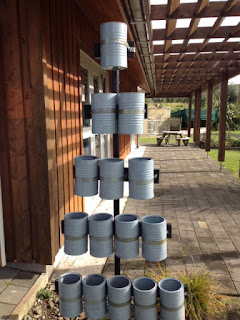At this year's National Bee Conference (over 800 delegates), we entered the photo competition in the category 'Essay'. In this section, a series of photos tell a story. Mr Mossop took fantastic photos on one of the days our students were helping to work the hive. These photos were put together to tell the story of how our students are learning and caring for our honeybees and that in the future these children will understand the importance of honey bees as plant pollinators. We one first prize in this category.
Search This Blog
Wednesday, 29 July 2015
The Year 5/6 Sustainable Elective developed their learning about the vital resource of water and how it is essential to all living things. They gained an understanding of the scientific thinking behind water flow, water molecules and states of matter. After observing and exploring our school for sources of water and water run off, they became interested in the Living Room mini wetland garden and its water feature, The Fountain of Power. A visit to Waiwhakareke Wetland in our Hamilton city consolidated their understanding about the importance of declining wetlands locally and globally. Wetlands are the kidneys of nature, storing and soaking up excess water and releasing it back with all the pollution particles destroyed by their helpful bacteria. Back at school, research was completed on the threatened and most important wetlands in the world and student iPad presentations were developed to increase the awareness of these special places. On a local front, student action was to make their own water flow models and to restore the Fountain of Power back to its original state. They also replanted the vegetable garden and looked at the percentage of water in different foods. This also developed the idea of making Hukanui Chutney and Pickle. What fantastic actions were initiated by our students.
Thursday, 23 July 2015
Term 2 saw the end of our Year 3/4 Honeybee Elective. In this elective our students gained real life experiences helping to care for our school's beehive. The aims of the elective were to understand the scientific features of honey bees, why they are important in our natural world and how we can care for them. Students learnt that honey bees are one of the many insects in our environment, the special features of a honey bee, its proboscis, honey stomach, antennae, head, thorax and abdomen, pollen baskets and antennae.
 |
| Searching for insects in our school environment |
 |
| Recording our weekly learning in a diary. |

Learning what to do when a honey bee lands on us, so they don't get scared and sting us. We keep calm, stand still and ask someone to carefully flick the honey bee off.
We have our honeybees so that they pollinate our flowers to make new seeds that will grow into plants. Did you know that more than 60% of the food that we eat relies on the honey bee to pollinate it? Even chocolate!
Caring for the beehive is very important. We harvested honey when the bees had covered the frame with wax and we 'wintered 'our bees down safely the cold season. We have a bee garden for winter which is an important food supply during the cold winter months when there are not many flowers to sip nectar from.
The most important reason for our honeybees is to pollinate our flowers. Honey is a bonus and we enjoyed using it in our cooking and ice block making.
Subscribe to:
Comments (Atom)
























